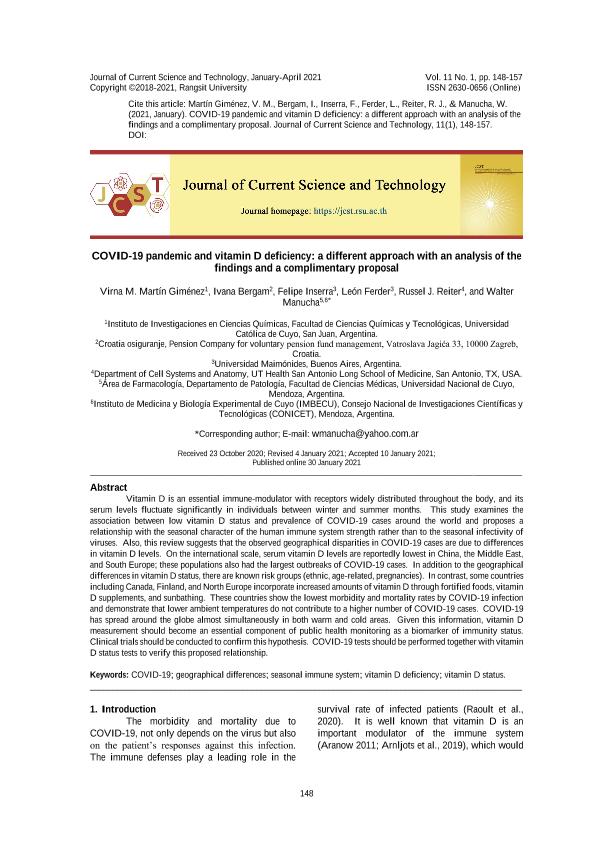Artículo
COVID-19 pandemic and vitamin D deficiency: a different approach with an analysis of the findings and a complimentary proposal
Martín Giménez, Virna Margarita ; Bergam, Ivana; Inserra, Felipe; Ferder, Leon Fernando; Reiter, Russel; Manucha, Walter Ariel Fernando
; Bergam, Ivana; Inserra, Felipe; Ferder, Leon Fernando; Reiter, Russel; Manucha, Walter Ariel Fernando
 ; Bergam, Ivana; Inserra, Felipe; Ferder, Leon Fernando; Reiter, Russel; Manucha, Walter Ariel Fernando
; Bergam, Ivana; Inserra, Felipe; Ferder, Leon Fernando; Reiter, Russel; Manucha, Walter Ariel Fernando
Fecha de publicación:
01/2021
Editorial:
Rangsit University
Revista:
Journal of Current Research and Technology
ISSN:
2077-0383
e-ISSN:
2630-0656
Idioma:
Inglés
Tipo de recurso:
Artículo publicado
Clasificación temática:
Resumen
Vitamin D is an essential immune-modulator with receptors widely distributed throughout the body, and its serum levels fluctuate significantly among individuals between winter and summer months (from 30 to 50%). This study examines the association between low vitamin D status and prevalence of COVID-19 cases around the world and proposes a relationship between the seasonal character of the human immune system strength rather than to the seasonal infectivity of viruses. Also, this review suggests the observed geographical disparities in COVID-19 infections were due to differences in vitamin D levels. On the international scale, serum vitamin D levels are reportedly lowest in China, the Middle East, and South Europe; these populations also had the largest outbreaks of COVID-19 cases. In addition to the geographical differences in vitamin D status, there are known risk groups (ethnic, age-related, pregnancies). On the contrary, some countries including Canada, Finland, and North Europe incorporate increased amounts of vitamin D through fortified foods, vitamin D supplements, and sunbathing. These countries show the lowest morbidity and mortality rates by COVID-19 infection and demonstrate that lower ambient temperatures do not contribute to a higher number of COVID-19 cases. COVID-19 has spread around the globe almost simultaneously in both warm and cold areas. Given this information, vitamin D measurement should become an essential component of public health monitoring as a biomarker of immunity status. Clinical trials should be conducted to confirm this hypothesis. COVID-19 tests should be performed together with vitamin D status tests to verify this proposed relationship.
Archivos asociados
Licencia
Identificadores
Colecciones
Articulos(CCT - SAN JUAN)
Articulos de CENTRO CIENTIFICO TECNOLOGICO CONICET - SAN JUAN
Articulos de CENTRO CIENTIFICO TECNOLOGICO CONICET - SAN JUAN
Articulos(IMBECU)
Articulos de INST. DE MEDICINA Y BIO. EXP. DE CUYO
Articulos de INST. DE MEDICINA Y BIO. EXP. DE CUYO
Citación
Martín Giménez, Virna Margarita; Bergam, Ivana; Inserra, Felipe; Ferder, Leon Fernando; Reiter, Russel; et al.; COVID-19 pandemic and vitamin D deficiency: a different approach with an analysis of the findings and a complimentary proposal; Rangsit University; Journal of Current Research and Technology; 11; 1; 1-2021; 148-157
Compartir
Altmétricas



